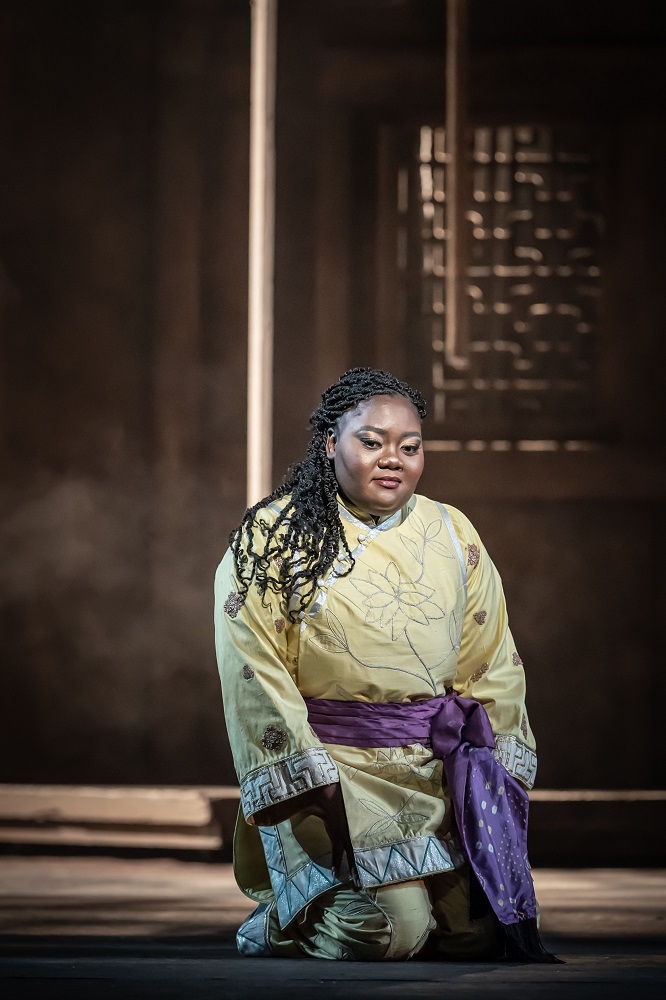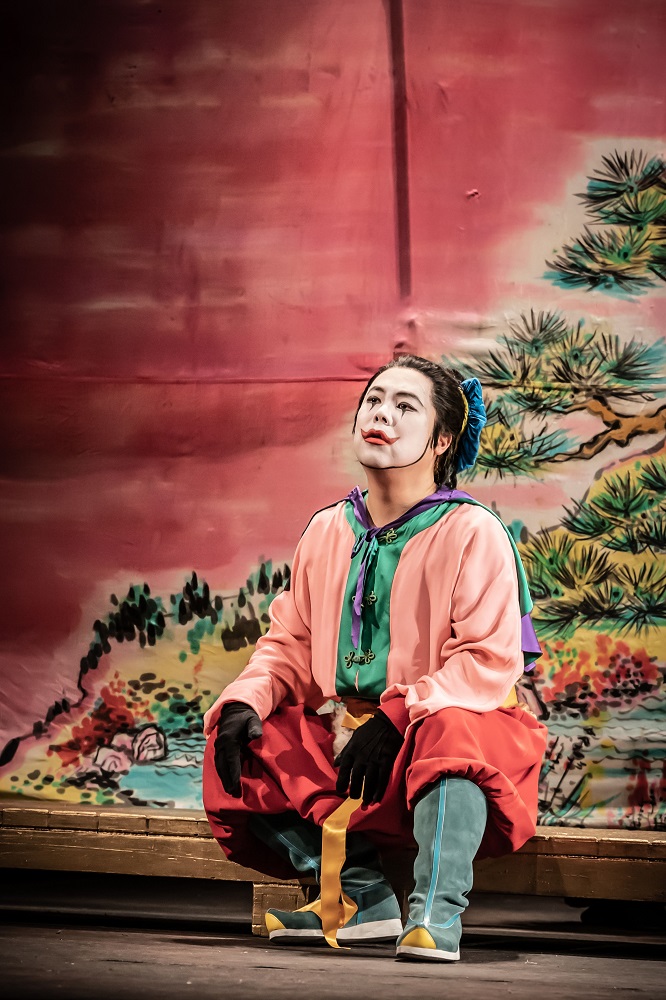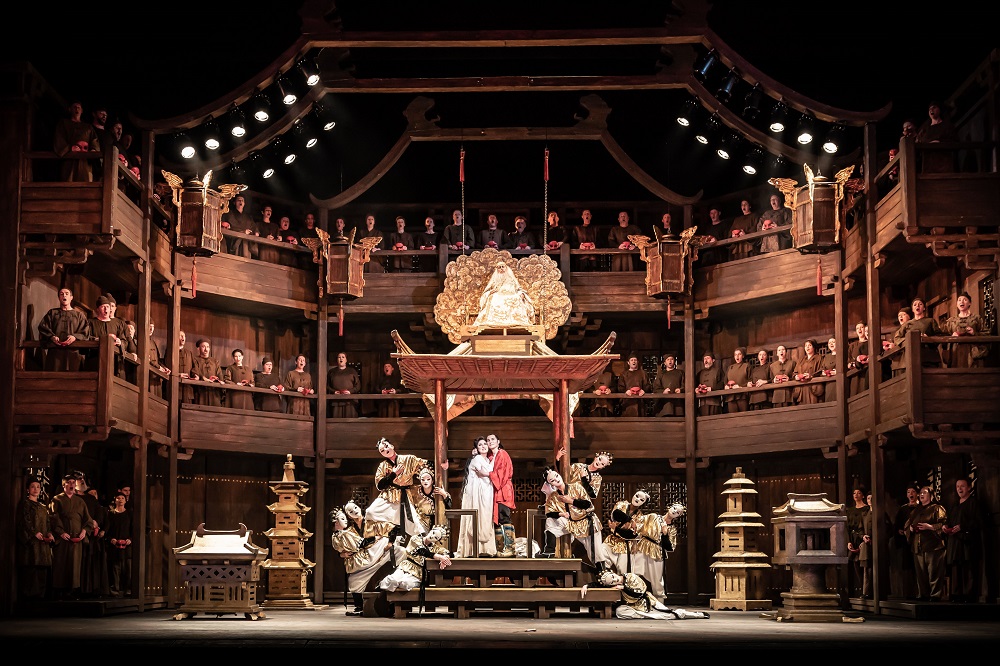Nearly 40 years old, Andrei Serban’s Royal Opera Turandot feels like a gilded relic (I felt like a relic myself on learning that my writer neighbour wasn’t born when I saw Gwyneth Jones as the ice princess in 1984). Yet so too, outwardly, did Puccini’s only really grand opera when it premiered in the 1920s, exoticism being mostly confined to operettas and musicals. What keeps it modern is the score, which made it vital to hear what Antonio Pappano had to say with it.
The Royal Opera’s long-serving, much-loved Music Director will probably beg to differ from a position of infinitely greater experience, but it struck me that so much of Puccini’s swansong, special effects included, conducts itself. If anything, we could have done with greater volume in the savage and ceremonial collective moments; though the wood ought to project their sound, the chorus still sounds relatively muted, at some distance from the orchestra on the balconies; the wow factor belongs to the instruments alone.
 Where Pappano’s reputation as arguably the greatest living Puccini conductor came into its own was in his careful, chamber-musical support of the arias, allowing the wondrous Masabane Cecilia Rangwanasha (pictured left), in her first major role since she graduated with highest honours from the company’s Jette Parker Young Artists Programme, full flexible artistry in the three exquisite numbers spotlighting the slave-girl Liu (if only applause could have been avoided after the last one by going straight on to the chord that launches Calaf's response; the two arias and the ensemble make up a complete finale).
Where Pappano’s reputation as arguably the greatest living Puccini conductor came into its own was in his careful, chamber-musical support of the arias, allowing the wondrous Masabane Cecilia Rangwanasha (pictured left), in her first major role since she graduated with highest honours from the company’s Jette Parker Young Artists Programme, full flexible artistry in the three exquisite numbers spotlighting the slave-girl Liu (if only applause could have been avoided after the last one by going straight on to the chord that launches Calaf's response; the two arias and the ensemble make up a complete finale).
What stays with me most is the miraculously-scored music for the “masks” – commedia dell’arte characters in Gozzi’s 18th century original blend of fairy-tale and farce – and especially the scherzo/intermezzo-with-lyrical-interlude that begins Act Two. This is where the baritone can shine, and Korean Hansung Yoo (pictured below) made his mark, with characterful support from tenors Michael Gibson and Aled Hall. Puccini's most unrewarding bass role, that of Calaf's blind father Timur, has the right sound from Vitalij Kowalow, though Alexander Kravets makes more of an impression as the ancient Emperor Altoum on his golden cloud.
 The other Korean in the first cast, Yonghoon Lee, is handsome of form and an appropriately dark-hued tenor as hero Calaf, though without the vocal glamour of the greats (Corelli set an impossible benchmark). The vengeful princess he’s determined to win – these are mythic archetypes, never really creatures of flesh and blood – is strongly cast for the ringing top notes which if they fail, fail all. Anna Pirozzi nailed every single one, though the sun only came out through the clouds above the middle register.
The other Korean in the first cast, Yonghoon Lee, is handsome of form and an appropriately dark-hued tenor as hero Calaf, though without the vocal glamour of the greats (Corelli set an impossible benchmark). The vengeful princess he’s determined to win – these are mythic archetypes, never really creatures of flesh and blood – is strongly cast for the ringing top notes which if they fail, fail all. Anna Pirozzi nailed every single one, though the sun only came out through the clouds above the middle register.
The acting of the final duet, always hard to take after the suicide of Liu and completed with some inappropriately raucous scoring after Puccini’s death by the cruder Alfano, was mostly semaphoring; Pappano did find tenderness after the presumptuous kiss, though. I look forward to his new EMI recording, with a magnificent cast, to hear the uncut version, which it would be good to encounter on stage some time (Josephine Barstow did record the full deal in a showcase selection of operatic scenes, and it seemed to work better with smoother transitions).
It's now time to move on from pure chinoiserie to a harsher new production that emphasizes the cruelty of the story – totalitarian-state versions are the order of the day – but that always sits awkwardly with the pointedly pentatonic and oriental quaintnesses in the opera.  For comparison between old and new orders, you can see what Robert Carsen makes of Verdi's Aida, also in the current repertoire: a consistent vision ignoring the middle-Eastern allure in some of the music. And of course there's still pure visual exoticism on parade in ENO production of Akhnaten, running concurrently, if you can stomach Glass's score (I simply can't, though a colleague was set to review and couldn't go at the last minute). Here Sally Jacobs’ set and costume designs still look sensational, with lighting by F Mitchell Dana to complement. What happens within them seems to have been reasonably sharpened up by revival director Jack Furness; but the spectacle’s the thing; no-one will leave disappointed.
For comparison between old and new orders, you can see what Robert Carsen makes of Verdi's Aida, also in the current repertoire: a consistent vision ignoring the middle-Eastern allure in some of the music. And of course there's still pure visual exoticism on parade in ENO production of Akhnaten, running concurrently, if you can stomach Glass's score (I simply can't, though a colleague was set to review and couldn't go at the last minute). Here Sally Jacobs’ set and costume designs still look sensational, with lighting by F Mitchell Dana to complement. What happens within them seems to have been reasonably sharpened up by revival director Jack Furness; but the spectacle’s the thing; no-one will leave disappointed.














Add comment